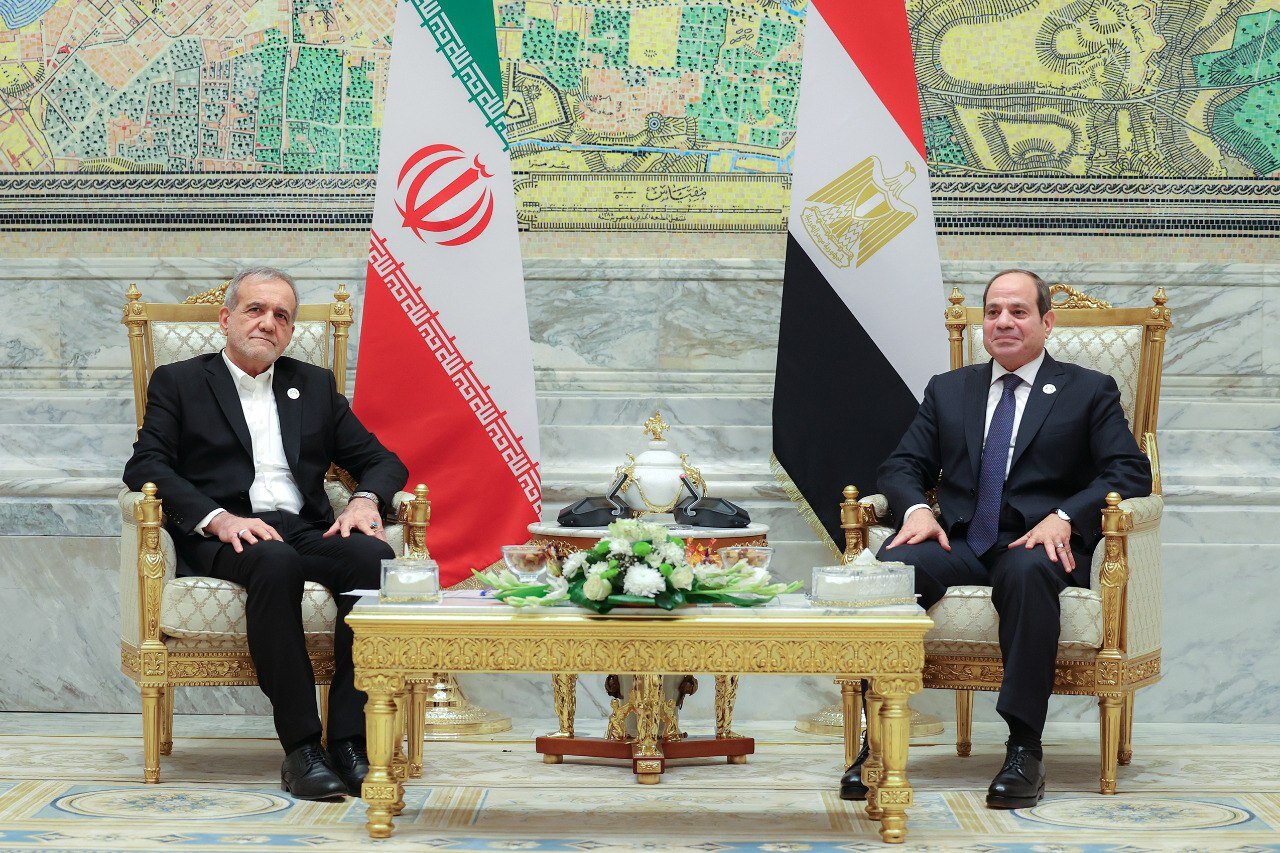Meeting in Cairo, Anxiety in Tel Aviv
Israel watches warily as Pezeshkian’s Cairo visit raises prospects for Iran-Egypt rapprochement

TEHRAN – Iranian President Masoud Pezeshkian is following in the footsteps of his predecessor. The surgeon-turned-politician is deepening Iran's connections in the region, forging stronger ties with Muslim nations and solidifying key alliances.
After patching up relations with Saudi Arabia in 2023, Iran has set its sights on a more important Arab actor: Egypt.
Following over four decades of strained relations, Iran and Egypt are closer to full rapprochement than ever before. This is underscored by President Pezeshkian's landmark visit to Cairo for the D-8 summit on Thursday; the first by an Iranian president in 11 years.
During his speech at the summit, Pezeshkian spoke of Iran’s vision for a close and united region. “The importance of preserving friendships and forging new bonds through multilateral cooperation among Islamic countries, based on development and collective benefits, is now felt more than ever," he said, adding, "Moving toward multilateralism and establishing smart economic and trade networks among nations is a rightful course of action, reflecting the will of the majority of countries.”
In his meeting with Egyptian counterpart Abdel Fattah el-Sisi on the sidelines of the summit, Pezeshkian made it clear that Iran sees strong ties with Egypt as an important piece in the regional puzzle it is trying to build. "All Islamic countries should strive to expand interaction and dialogue within the Islamic world according to their share, and overcome existing differences, as these differences provide a basis for foreign interventions," he stressed in remarks to Sisi.
The Egyptian president, for his part, expressed hope that the recent positive steps taken to restore ties between the two countries will continue until full bilateral relations are established.
Embassies could soon reopen in Tehran and Cairo, according to Mehdi Sanaei, a senior aide to President Pezeshkian. Speaking on the flight back from Cairo, Sanaei confirmed that "political talks and appropriate actions have started" between the two countries.
Nearly everyone welcomes the potential rapprochement between Iran and Egypt; Arab and Iranian media are celebrating the thaw in relations between these two regional powers. Israel, however, is the exception.
On Friday, Israel's i24 news channel aired a report on President Pezeshkian's visit to Cairo, framing the growing prospects for restored Iranian-Egyptian ties as a worrying development.
“One of the most concerning aspects of this [D-8] summit is the presence of Masoud Pezeshkian, the President of Iran, who is visiting Egypt for the first time in 11 years. This suggests a shift in attitudes and the potential for new collaborations between Egypt and Iran. Furthermore, the historic meeting with the President of Turkey highlights the strengthening of regional ties for Iran,” the news channel’s reporter stated.
Why is Israel fearful of an Iran-Egypt rapprochement?
Alireza Majidi, a West Asia and North Africa expert, describes Egypt as "arguably the most important Arab country," citing its ancient history, early modernization, and deep influence on other Arab nations.
“While recent economic challenges, particularly since Camp David, have led to foreign aid dependence, Egypt retains considerable influence today,” the expert added, elaborating on why Iran is willing to restore ties with Egypt.
Egypt is also keen to build a new relationship with Iran, Majidi pointed out. Tehran wields considerable influence across West Asia and beyond, significantly impacting regions crucial to Egypt, such as the Suez Canal and Bab al-Mandab Strait. Decisions made in Sana'a, the capital of Iran's close ally Yemen, heavily influence conditions in these waterways.
While it appears that Iran and Egypt have strong incentives to restore ties, Israel has been trying to stand in the way of that for the longest time. Majidi attributes Israel's opposition to a rapprochement between Iran and Egypt to two key factors: Iran's well-known anti-Israel posture and the persistence of anti-Zionist sentiment within Egyptian society.
“Even though Egyptian politicians normalized ties with Israel and signed Cam David accord, the Egyptian population still loathes Israel. Recent events in Gaza have exacerbated these feelings, leading the Israeli regime to believe that closer relations between Iran and Egypt would serve to reinforce anti-Israel sentiment within Egypt, one of the most important Arab actors.”
